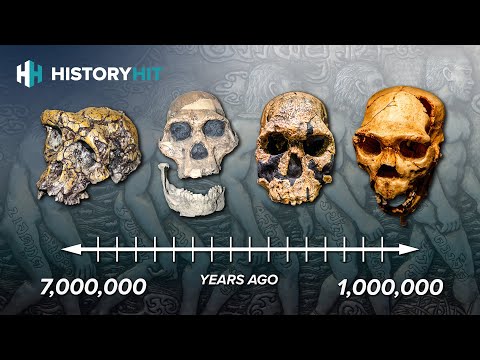Anthropologist: Job Description and Salary
An anthropologist is a professional who studies the development, behavior, and beliefs of human societies and cultures. They conduct extensive research and fieldwork to gather information about various communities and their practices. Anthropologists often specialize in a particular region or topic, such as cultural anthropology, linguistic anthropology, or archaeology. The job description of an anthropologist includes conducting interviews, surveys, and observations to collect data. They analyze this information to identify patterns, trends, and cultural variations. Anthropologists also collaborate with other researchers and experts to interpret their findings and draw conclusions about human behavior and societal norms. Anthropologists are employed in various sectors, including academia, government agencies, nonprofit organizations, and consulting firms. They often teach at universities and colleges, publish research papers, and present their work at conferences. Some anthropologists work as cultural consultants, helping businesses and organizations understand diverse cultures to develop effective strategies. Anthropologist Salary
The salary of anthropologists can vary depending on factors such as experience, education, and location. According to the Bureau of Labor Statistics, the median annual wage for anthropologists and archaeologists was $63,670 as of May 2020. Those working in management, scientific, and technical consulting services earned the highest salaries, while those in state and local government agencies earned slightly lower wages. Anthropologists with advanced degrees and extensive research experience often have better job prospects and higher earning potential. Additionally, working in urban areas or regions with a higher demand for anthropological expertise can lead to higher salaries. In conclusion, the job of an anthropologist involves studying human societies and cultures, conducting research, and analyzing data. The salary for anthropologists can vary, but with the right qualifications and experience, they can earn competitive wages in various sectors.

Anthropologist Job Description Template
Anthropologist Job Description An anthropologist is a professional who studies human societies, cultures, and behaviors in order to gain a deeper understanding of human nature and development. They conduct research, analyze data, and draw conclusions about various aspects of human life. Anthropologists work in various settings such as academic institutions, research organizations, museums, and government agencies. One of the key responsibilities of an anthropologist is to conduct fieldwork. This involves living among the people or communities they study, observing their daily lives, participating in their activities, and conducting interviews and surveys. Fieldwork allows anthropologists to gain firsthand knowledge and insights into different cultural practices and social dynamics. Another important aspect of an anthropologist’s job is to analyze and interpret data collected during fieldwork or from existing sources. They use various research methods and techniques to analyze cultural artifacts, linguistic patterns, social structures, and historical data. This analysis helps them to identify patterns, understand cultural change, and make comparisons across different societies. In addition to research and analysis, anthropologists also contribute to the preservation and promotion of cultural heritage. They collaborate with museums, cultural organizations, and local communities to document and protect cultural traditions, languages, and artifacts. They may also provide insights and recommendations to policymakers and organizations working with indigenous communities or marginalized groups. Overall, the work of an anthropologist requires a strong commitment to cultural sensitivity and ethical research practices. They need to have excellent critical thinking, communication, and writing skills to effectively convey their findings and insights to both academic and non-academic audiences. In conclusion, anthropologists play a crucial role in understanding and preserving human diversity, promoting cultural understanding, and contributing to social development. Their work helps us to better understand ourselves and the world we live in.Anthropologist Responsibilities
Anthropologist Requirements
How Much Does A Anthropologist Make?
Anthropologist Salary
| Position | Median Annual Salary |
|---|---|
| Anthropology Professor | $78,290 |
| Archaeologist | $63,670 |
| Research Anthropologist | $62,410 |
| Museum Anthropologist | $52,380 |
Anthropologist Salary varies depending on the position. As per the data, an Anthropology Professor earns a median annual salary of $78,290, while an Archaeologist earns $63,670. Research Anthropologists have a median salary of $62,410, and Museum Anthropologists earn $52,380. It is important to note that these figures are approximate and can vary based on factors such as experience, education, and location.
Anthropologist Salaries by Country
Top Paying Countries for Anthropologist
| Country | Average Salary (USD) |
|---|---|
| United States | 62,410 |
| Canada | 52,000 |
| Australia | 50,000 |
| United Kingdom | 48,000 |
| Germany | 47,000 |
Anthropologists play a crucial role in studying and understanding human societies and cultures. The salaries of anthropologists vary across countries, with the United States offering the highest average salary of $62,410. Canada follows closely with an average salary of $52,000, while Australia, the United Kingdom, and Germany offer average salaries of $50,000, $48,000, and $47,000 respectively. These top paying countries reflect the demand for anthropologists and the value placed on their expertise in research, analysis, and cultural preservation. However, it’s important to note that salary figures can vary based on factors such as experience, qualifications, and the specific field of anthropology. Overall, the field of anthropology offers diverse opportunities for professionals seeking to understand and contribute to the understanding of human societies.
A video on the topic Anthropologist
Video Source : History HitInterview Questions for Anthropologist
1. What is anthropology?
Anthropology is the scientific study of human beings, their societies, cultures, and their development over time.
2. What are the main branches of anthropology?
The main branches of anthropology are cultural anthropology, physical anthropology, linguistic anthropology, and archaeology.
3. What is cultural anthropology?
Cultural anthropology is the study of human cultures, their beliefs, practices, social structures, and how they vary across different societies.
4. What is physical anthropology?
Physical anthropology, also known as biological anthropology, is the study of human evolution, genetics, primatology, and human biological variation.
5. What is linguistic anthropology?
Linguistic anthropology is the study of language and its role in human culture, communication, and social interaction.
6. What is archaeology?
Archaeology is the study of human history and prehistory through the excavation and analysis of artifacts, structures, and other physical remains.
7. What methods do anthropologists use in their research?
Anthropologists use a variety of methods in their research, including participant observation, interviews, surveys, archival research, and laboratory analysis.
8. How does anthropology contribute to society?
Anthropology contributes to society by providing insights into human behavior, cultural diversity, and the challenges faced by different communities. It helps us understand and appreciate the complexities of human societies and promotes cultural sensitivity and tolerance.
9. What skills are important for an anthropologist?
Important skills for an anthropologist include critical thinking, cultural sensitivity, strong communication and writing abilities, research skills, and the ability to work well with diverse groups of people.
10. What are some current issues studied by anthropologists?
Current issues studied by anthropologists include globalization, migration, climate change and its impact on communities, indigenous rights, gender and sexuality, and cultural preservation in the face of modernization.






